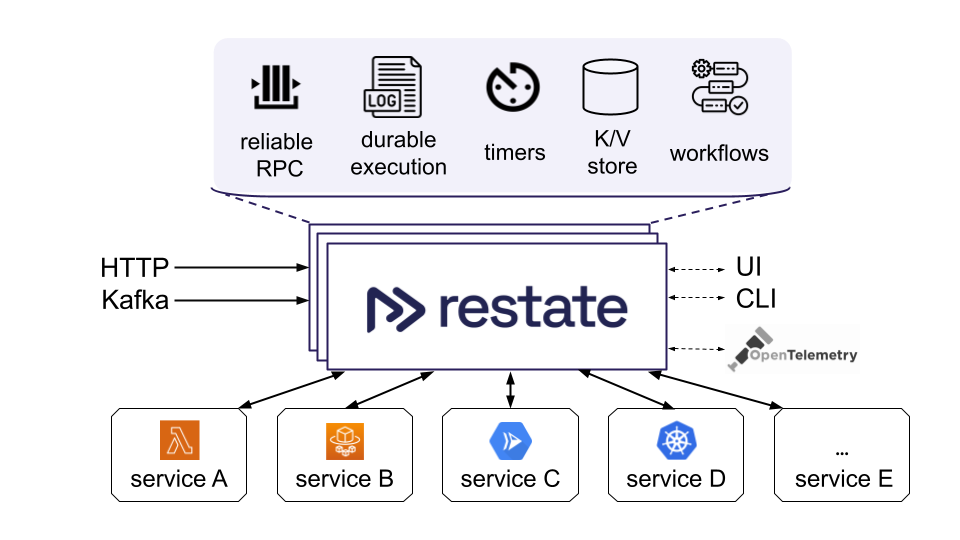
Restate is the simplest way to build resilient applications.
Restate provides a distributed durable version of your everyday building blocks, letting you build a wide range of use cases:
- Workflows-as-Code
- Microservice orchestration
- Event Processing
- Async Tasks
- Agents, Stateful Actors, state machines, and much more
- 🏎 Follow the Quickstart to get Restate up and running within 2 minutes!
- 💡 The Tour of Restate walks you through the most important features of Restate.
Restate supports the following SDKs:
We offer pre-built binaries of the CLI and the server for MacOS and Linux.
Have a look at the Quickstart or installation instructions in the docs.
Install via Homebrew:
brew install restatedev/tap/restate-serverRun via npx:
npx @restatedev/restate-serverRun via docker:
docker run --rm -p 8080:8080 -p 9070:9070 -p 9071:9071 \
--add-host=host.docker.internal:host-gateway docker.restate.dev/restatedev/restate:latestInstall via Homebrew:
brew install restatedev/tap/restateInstall via npm:
npm install --global @restatedev/restateRun via npx:
npx @restatedev/restateYou can also download the binaries from the release page or our download page.
- 🤗️ Join our online community on Discord or Slack for help, sharing feedback and talking to the community.
- 📖 Check out our documentation to get started quickly!
- 📣 Follow us on Twitter for staying up to date.
- 🙋 Create a GitHub issue for requesting a new feature or reporting a problem.
- 🏠 Visit our GitHub org for exploring other repositories.
The basic primitives Restate offers to simplify application development are the following:
- Reliable Execution: Restate guarantees code runs to completion. Failures result in retries that use the Durable Execution mechanism to recover partial progress and prevent re-executing completed steps.
- Reliable Communication: Services communicate with exactly-once semantics: whether it's request-response, one-way messages, or scheduled tasks. Restate reliably delivers messages and uses Durable Execution to ensure no losses or duplicates can happen.
- Durable Promises and Timers: Register Promises/Futures and timers in Restate to make them resilient to failures (e.g. sleep, webhooks, timers). Restate can recover them across failures, processes, and time.
- Consistent State: Implement stateful entities with isolated K/V state per entity. Restate persists the K/V state updates together with the execution progress to ensure consistent state. Restate attaches the K/V state to the request on invocation, and writes it back upon completion. This is particularly efficient for FaaS deployments (stateful serverless, yay!).
- Suspending User Code: long-running code suspends when awaiting on a Promise/Future and resumes when that promise is resolved. This is particularly useful in combination with serverless deployments.
- Observability & Introspection: Restate includes a UI and CLI to inspect the state of your application across services and invocations. Restate automatically generates Open Telemetry traces for the interactions between handlers.
We’re excited if you join the Restate community and start contributing! Whether it is feature requests, bug reports, ideas & feedback or PRs, we appreciate any and all contributions. We know that your time is precious and, therefore, deeply value any effort to contribute!
Check out our development guidelines and tips for local development to get started.
Restate follows Semantic Versioning.
You can safely upgrade from a Restate x.y to x.(y+1) release without performing any manual data migration, as Restate performs an automatic data migration for you.
For SDK compatibility, refer to the supported version matrix in the respective READMEs:
In order to build Restate locally follow the build instructions.




